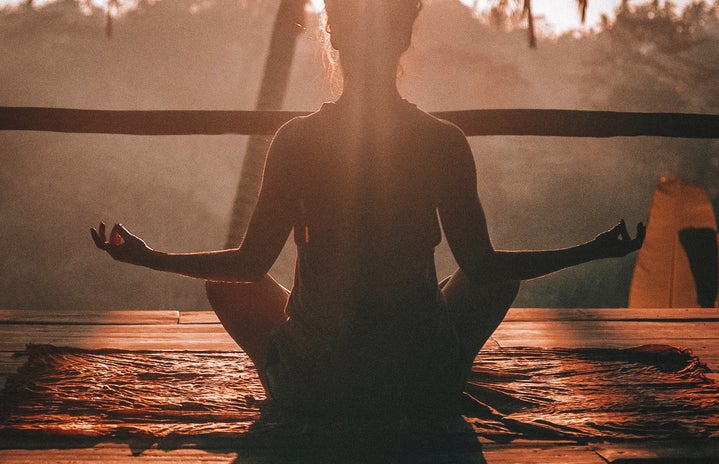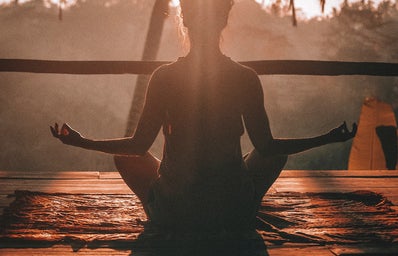In the midst of everything that is happening right now, sometimes it is hard to cope with changes that occur in everyday life.
Everyday, we post multitudes of information about ourselves and our opinions, caring about what other people think of us and craving for more and more attention. In other words, these factors can cause us to lose a part of ourselves — we lose our sanity.
I was in a position where I was constantly seeking validation from other people, yearning for love, and longing for things to be going beautifully my way. It all sums down to three words: lack of control. When you lack control of a certain situation, you can feel that you are becoming crazy because you have lost all your power as a human to perfect things your way. Constantly feeling like you lack control can really affect your mental health. It wasn’t until I started meditating with Calm that things started to change; I earned a new heart.
Many people have misconceptions about meditation.
People always associate meditation with solely breathing or think of meditation as a process to finding serenity. Although these assumptions are overall correct, meditation is much more than what you think it is. Those assumptions are equivalent to the statement that music is pop, but it is overlooked that there are still many more genres of music than just pop.
First, when you start meditating, it’s important that you have a “home base”: what you stick to while meditating.
There are many types of “home base” you can adhere to. During meditation, you can listen to the sounds around you, feel the ground pushing back against you as you sit still, look ahead at the plain white wall in front of you, or just breathe. It’s totally up to you and what you are comfortable with. The purpose of having a “home base” is to remind yourself so that you are aware that you are living in the present moment. You are making a mental note that you are existing with an open and neutral heart.
For me, breathing is my home base because breathing involves two things: inhaling and exhaling. When I breathe, I’m allowed to envision the relationship between myself and nature, the relationship between myself and others, and the relationship between myself and myself. Breathing always reminds me that I breathe in to take a piece of the world and I exhale to give back myself to the world. Moreover, breathing reminds me that the world consists of balanced opposites. That we must remember that in happiness we find sadness, in light we find darkness, in comfort we find discomfort, etc.

If you think that having a “home base” alone cannot hold your concentration, having a “label” could be your next lookout.
A “label” is what you continuously repeat to yourself to maintain your focus. For example, when I breathe during my meditation, I say to myself “breathe”, which is my “label”. With a label, you can bring back your thoughts to the present moment when they start wandering off, practicing your muscle of concentration.
A lot of people don’t like to meditate because they know that they will eventually get distracted and don’t know what to do when they suddenly can’t sit still anymore. There are misconceptions that we must get rid of those “distracting thoughts” as soon as they jump in. However, like many other fields, meditation is trial and error. All close-to-perfect work starts with really imperfect work. You must realize that in order to master meditation you first have to accept distractions with a neutral and open heart. And after you learn how to accept those thoughts, you can then let go of them and come back to the present moment once again. It’s not about how fast you can get rid of distractions, it’s about how you can accept that it has happened and then let it go.
This process can really be compared to our real lives.
In your real life, just like your distracting thoughts, there will be many situations where you completely don’t have control over. You can’t always choose what you want to feel and start pushing away what you don’t want to feel. You can’t choose what you want to happen and ignore blissfully what you don’t want to happen. Meditation teaches you how to react in the right way to those complicated situations. It builds your muscle of equanimity and clarity by letting you train your thoughts to accept and set free. Meditation establishes your new relationship with your surroundings, where you are always aware of what you feel and welcome whatever comes into your life.
When you meditate, imagine yourself as a big huge mountain, where you can be open, steady, and rooted.
You must think of everything as having empty space, where you allow everything to come into your space and exit out of your space. This space is your awareness of your surroundings, your tolerance, and your open and neutral heart. You can also change your “label” to “welcome” when you think of that certain space. Imagine that the space in front of you doesn’t have any restrictions and can extend beyond forever.
Finally, the most important lesson meditation has brought me is my ability to practice my “compassion muscle”.
Ever wonder what the difference between compassion and empathy is? Empathy is when you put yourself in someone else’s shoes and try to feel the exact same way as them. However, over time having empathy can hurt you. What if the other person is feeling angry? Do you have to feel their pain and feel the exact same anger that they are feeling? Over time, empathy causes you to burn out. On the other hand, compassion is what meditation is targeting you to practice. Having compassion is about having concern, patience, and solidity for others. It’s about wishing that person “May You Be Well”. By just having your “home base” and living within the moment, your presence is already the fundamental ground to active compassion. During meditation, when you practice compassion, just visualize somebody in particular. You usually start with people or someone you are care about to make things easier and then extend it towards strangers or other living creatures on this planet. Repeat “May You Be Well”. Most importantly, you can start practicing compassion by thinking about yourself. Most of the time, we are addicted to feeling pain and forget to practice compassion for ourselves.
Meditation has changed my life and my perspective of the world. Meditation has taught me to have gratitude for what I already have and accept new changes that come in. It gave me a new heart: a calm, accepting, concentrated, neutral, open and compassionate heart. Remember it’s okay that we’re in a situation where we don’t have control of everything. Next time when you start to panic or feel anxious about something, find a comfortable spot, sit still, and start meditating!


